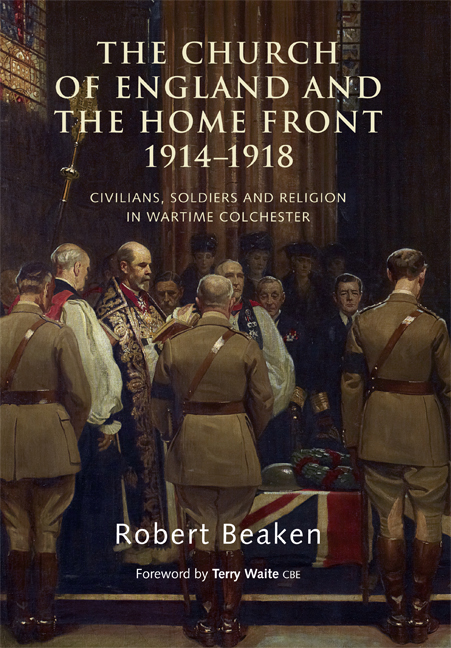 The Church of England and the Home Front, 1914-1918
The Church of England and the Home Front, 1914-1918 Book contents
- Frontmatter
- Dedication
- Contents
- List of Illustrations
- Foreword
- Author’s Acknowledgements
- 1 The First World War – One Hundred Years On
- 2 Colchester
- 3 Wartime
- 4 The Clergy
- 5 The Laity
- 6 Prayer and Worship
- 7 The National Mission of Repentance and Hope
- 8 Thought and Attitudes
- 9 Armistice, Remembrance and Aftermath
- 10 The Church of England and the First World War
- Bibliography
- Index
9 - Armistice, Remembrance and Aftermath
Published online by Cambridge University Press: 11 May 2021
- Frontmatter
- Dedication
- Contents
- List of Illustrations
- Foreword
- Author’s Acknowledgements
- 1 The First World War – One Hundred Years On
- 2 Colchester
- 3 Wartime
- 4 The Clergy
- 5 The Laity
- 6 Prayer and Worship
- 7 The National Mission of Repentance and Hope
- 8 Thought and Attitudes
- 9 Armistice, Remembrance and Aftermath
- 10 The Church of England and the First World War
- Bibliography
- Index
Summary
It was something of an historical accident that the First World War ended at 11.00 a.m. on Monday 11 November, 1918. Lloyd George had instructed Admiral Sir Rosslyn Wemyss, the British representative at the Armistice negotiations at Compiègne, to arrange that the Armistice should commence at 2.30 p.m. in order that he might announce it in the House of Commons between 2.45 p.m. and 3.00 p.m., and presumably make political capital of the news.
Admiral Wemyss exceeded his orders: he felt that more lives might be lost if the war dragged on for even a few hours longer than was absolutely necessary; and the poetry of hostilities coming to a close at the eleventh hour of the eleventh day of the eleventh month appealed strongly to him. The French and the Germans agreed to Wemyss's suggestion of 11.00 a.m., and the Armistice was signed at 5.10 a.m. The French agreed to transmit the news to the Allied front line. Wemyss hurried back to Paris, and, fearing Lloyd George's reaction to his initiative, he bypassed the prime minister and managed to telephone George V at Buckingham Palace. The king and his staff spent the next few hours telephoning the news of the Armistice to the government and military and naval authorities. Wemyss's anxiety about the reaction of Lloyd George was well founded: when he reported to the prime minister and cabinet on 19 November, he was shocked to find them ungrateful and vindictive. Wemyss did not receive the £100,000 grant awarded by the government to other service chiefs, such as Admiral Beatty. He also had to wait a year longer for his peerage than the other senior officers honoured at the end of the war, and he was only made a baron (Baron Wester Wemyss) rather than an earl, like the others.
The Armistice in Colchester
The news of the Armistice reached Colchester during the morning of 11 November 1918. Jack Ashton recalled seeing a bugler march to the centre of the square at Goojerat Barracks and stand to attention. On the stroke of 11.00 a.m., he sounded his bugle. The town council was meeting when the news was received.
Information
- Type
- Chapter
- Information
- The Church of England and the Home Front, 1914-1918Civilians, Soldiers and Religion in Wartime Colchester, pp. 223 - 232Publisher: Boydell & BrewerPrint publication year: 2015